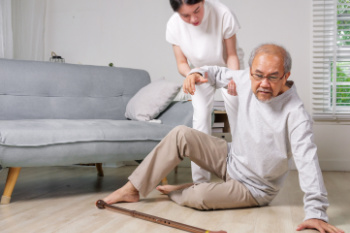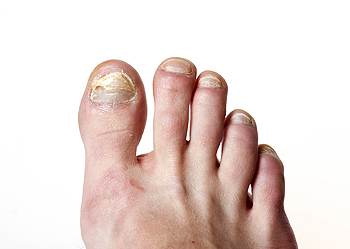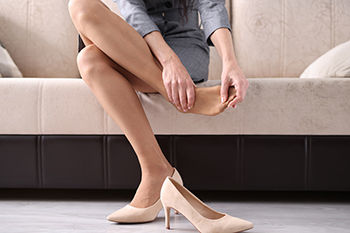Connect With Us
Blog
Items filtered by date: April 2024
Causes and Symptoms of Achilles Tendonitis

Despite its association with strength, the Achilles tendon is susceptible to injury which can lead to discomfort and impair mobility. Several factors contribute to the development of Achilles tendonitis, including wearing improper footwear, overexertion during activities like speed or mountain running, and insufficient recovery time between training sessions. Other causes can include incorrect loading of weight on the legs or feet, poor running technique, and a lack of proper warm-up exercises. These factors collectively strain this strong tendon, leading to micro-tears in its structure. If left untreated, Achilles tendonitis can progress through various stages of severity. Initially, Achilles tendonitis may cause discomfort during activity or mild pain, which diminishes with rest and conservative measures. However, as the condition progresses, symptoms worsen, with visible changes in the tendon's structure and increased pain levels. Scar tissue formation and a loss of full functionality characterize the advanced stage of this injury. If you are experiencing Achilles tendon pain, it is suggested that you schedule an appointment with a podiatrist for an exam, diagnosis, and treatment options.
Achilles tendon injuries need immediate attention to avoid future complications. If you have any concerns, contact Arthur Segall, Jr., DPM of Segall Foot and Ankle. Our doctor can provide the care you need to keep you pain-free and on your feet.
What Is the Achilles Tendon?
The Achilles tendon is a tendon that connects the lower leg muscles and calf to the heel of the foot. It is the strongest tendon in the human body and is essential for making movement possible. Because this tendon is such an integral part of the body, any injuries to it can create immense difficulties and should immediately be presented to a doctor.
What Are the Symptoms of an Achilles Tendon Injury?
There are various types of injuries that can affect the Achilles tendon. The two most common injuries are Achilles tendinitis and ruptures of the tendon.
Achilles Tendinitis Symptoms
- Inflammation
- Dull to severe pain
- Increased blood flow to the tendon
- Thickening of the tendon
Rupture Symptoms
- Extreme pain and swelling in the foot
- Total immobility
Treatment and Prevention
Achilles tendon injuries are diagnosed by a thorough physical evaluation, which can include an MRI. Treatment involves rest, physical therapy, and in some cases, surgery. However, various preventative measures can be taken to avoid these injuries, such as:
- Thorough stretching of the tendon before and after exercise
- Strengthening exercises like calf raises, squats, leg curls, leg extensions, leg raises, lunges, and leg presses
If you have any questions please feel free to contact our offices located in Plantation, FL Ft. Lauderdale, F . We offer the newest diagnostic tools and technology to treat your foot and ankle needs.
Dangers of Falls Among Seniors

As you age, the risk of falls becomes a serious concern. Statistics reveal that more than one-fourth of older adults experience a fall each year. Many falls go unreported to doctors despite the doubled chances of falling again after the first incident. Falls often result in severe consequences, such as broken bones or head injuries that may compromise physical health and reduce independence. Contributing factors to falling include foot pain or wearing poorly fitting footwear. Additionally, lower body weakness, vision problems, and medication side effects can contribute to the risk of falls in older adults. To help prevent falls, seniors are encouraged to schedule appointments with a podiatrist to assess foot health, footwear, and gait abnormalities. Engaging in regular strength and balance exercises can help by improving stability and reducing fall risk. Regular eye exams and updating eyeglasses as needed can enhance visual clarity, especially for outdoor activities. Making the home environment safer by eliminating trip hazards, installing grab bars in bathrooms, and ensuring adequate lighting is also important in fall prevention. If you have injured your feet during a fall, it is suggested that you schedule an appointment with a podiatrist.
Preventing falls among the elderly is very important. If you are older and have fallen or fear that you are prone to falling, consult with Arthur Segall, Jr., DPM from Segall Foot and Ankle. Our doctor will assess your condition and provide you with quality advice and care.
Every 11 seconds, an elderly American is being treated in an emergency room for a fall related injury. Falls are the leading cause of head and hip injuries for those 65 and older. Due to decreases in strength, balance, senses, and lack of awareness, elderly persons are very susceptible to falling. Thankfully, there are a number of things older persons can do to prevent falls.
How to Prevent Falls
Some effective methods that older persons can do to prevent falls include:
- Enrolling in strength and balance exercise program to increase balance and strength
- Periodically having your sight and hearing checked
- Discuss any medications you have with a doctor to see if it increases the risk of falling
- Clearing the house of falling hazards and installing devices like grab bars and railings
- Utilizing a walker or cane
- Wearing shoes that provide good support and cushioning
- Talking to family members about falling and increasing awareness
Falling can be a traumatic and embarrassing experience for elderly persons; this can make them less willing to leave the house, and less willing to talk to someone about their fears of falling. Doing such things, however, will increase the likelihood of tripping or losing one’s balance. Knowing the causes of falling and how to prevent them is the best way to mitigate the risk of serious injury.
If you have any questions, please feel free to contact our offices located in Plantation, FL Ft. Lauderdale, F . We offer the newest diagnostic and treatment technologies for all your foot care needs.
Causes of Foot Pain in Children

Understanding the causes of foot pain in children is essential for parents. Common factors that may affect your child’s feet include wearing ill-fitting shoes without proper cushioning, which can lead to pain over time. Conditions like Achilles tendonitis, often observed in active children, result from repetitive strain on the Achilles tendon and can lead to swelling and pain. Fractures and injuries can cause acute pain and contribute to the development of bunions. Bursitis and corns or calluses, often caused by wearing poorly fitting shoes, can result in inflammation and thickened skin. Structural issues, such as flat feet, or postural defects may also contribute to childhood foot discomfort. Inflammatory conditions like juvenile arthritis can cause persistent foot pain. For appropriate treatment to address your child's foot pain, it is suggested that you schedule an appointment with a podiatrist who can conduct a full exam and offer an accurate diagnosis and effective treatment plan.
Making sure that your children maintain good foot health is very important as they grow. If you have any questions, contact Arthur Segall, Jr., DPM of Segall Foot and Ankle. Our doctor can provide the care you need to keep you pain-free and on your feet.
Keeping Children's Feet Healthy
Having healthy feet during childhood can help prevent medical problems later in life, namely in the back and legs. As children grow, their feet require different types of care. Here are some things to consider...
Although babies do not walk yet, it is still very important to take care of their feet.
Avoid putting tight shoes or socks on his or her feet.
Allow the baby to stretch and kick his or her feet to feel comfortable.
As a toddler, kids are now on the move and begin to develop differently. At this age, toddlers are getting a feel for walking, so don’t be alarmed if your toddler is unsteady or ‘walks funny’.
As your child gets older, it is important to teach them how to take care of their feet.
Show them proper hygiene to prevent infections such as fungus.
Be watchful for any pain or injury.
Have all injuries checked by a doctor as soon as possible.
Comfortable, protective shoes should always be worn, especially at play.
If you have any questions please feel free to contact our offices located in Plantation, FL Ft. Lauderdale, F . We offer the newest diagnostic and treatment technologies for all your foot and ankle needs.
See Your Foot Specialist Regularly If You Work On Your Feet
Managing Fungal Toenail Infections

Fungal toenail infections can be recognized by the slow development of discolored, thickened, and distorted nails, often accompanied by discomfort. Although not typically serious, fungal toenail infections can be bothersome and challenging to address. Fungal toenail infections typically arise from fungi prevalent in warm, moist environments, like gym locker rooms. Contributing factors include poor foot hygiene, sweaty footwear, and exposure to communal areas where people are likely to be barefoot. Treatment options encompass antifungal medications, although it may take a long time and cause side effects. While mild cases may resolve without intervention, severe infections often necessitate medical attention. It is suggested that you schedule an appointment with a podiatrist for an accurate diagnosis and options for more advanced treatment.
If left untreated, toenail fungus may spread to other toenails, skin, or even fingernails. If you suspect you have toenail fungus it is important to seek treatment right away. For more information about treatment, contact Arthur Segall, Jr., DPM of Segall Foot and Ankle. Our doctor can provide the care you need to keep you pain-free and on your feet.
Symptoms
- Warped or oddly shaped nails
- Yellowish nails
- Loose/separated nail
- Buildup of bits and pieces of nail fragments under the nail
- Brittle, broken, thickened nail
Treatment
If self-care strategies and over-the-counter medications does not help your fungus, your podiatrist may give you a prescription drug instead. Even if you find relief from your toenail fungus symptoms, you may experience a repeat infection in the future.
Prevention
In order to prevent getting toenail fungus in the future, you should always make sure to wash your feet with soap and water. After washing, it is important to dry your feet thoroughly especially in between the toes. When trimming your toenails, be sure to trim straight across instead of in a rounded shape. It is crucial not to cover up discolored nails with nail polish because that will prevent your nail from being able to “breathe”.
In some cases, surgical procedure may be needed to remove the toenail fungus. Consult with your podiatrist about the best treatment options for your case of toenail fungus.
If you have any questions, please feel free to contact our offices located in Plantation, FL Ft. Lauderdale, F . We offer the newest diagnostic and treatment technologies for all your foot care needs.
How Aging Can Affect Women’s Feet

As women age, their feet undergo various changes that can affect their comfort and mobility. Menopause-induced hormonal shifts often lead to dry, calloused skin, making the feet susceptible to painful fissures and infections. Weight gain in middle age can weaken the arches, causing conditions like plantar fasciitis. The loss of fat padding on the balls of the feet and heels can result in metatarsalgia and heel pain, especially for those who spent years wearing high heels. Additionally, arthritis of the big toe joint, known as hallux rigidus, can cause pain and stiffness with each step. Bunions, caused by genetic factors and years of wearing narrow-toed shoes, are also common causes of foot pain in older women. To address these issues and maintain foot health, women over 50 need to prioritize regular foot care and wear supportive footwear. However, if foot pain persists or worsens, it is suggested that you make an appointment with a podiatrist for personalized treatment and care.
Proper foot care is something many older adults forget to consider. If you have any concerns about your feet and ankles, contact Arthur Segall, Jr., DPM from Segall Foot and Ankle. Our doctor can provide the care you need to keep you pain-free and on your feet.
The Elderly and Their Feet
As we age we start to notice many changes in our body, but the elder population may not notice them right away. Medical conditions may prevent the elderly to take notice of their foot health right away. Poor vision is a lead contributor to not taking action for the elderly.
Common Conditions
- Neuropathy – can reduce feeling in the feet and can hide many life-threatening medical conditions.
- Reduced flexibility – prevents the ability of proper toenail trimming, and foot cleaning. If left untreated, it may lead to further medical issues.
- Foot sores – amongst the older population can be serious before they are discovered. Some of the problematic conditions they may face are:
- Gouging toenails affecting nearby toe
- Shoes that don’t fit properly
- Pressure sores
- Loss of circulation in legs & feet
- Edema & swelling of feet and ankles
Susceptible Infections
Diabetes and poor circulation can cause general loss of sensitivity over the years, turning a simple cut into a serious issue.
If you have any questions please feel free to contact our offices located in Plantation, FL Ft. Lauderdale, F . We offer the newest diagnostic and treatment technologies for all your foot and ankle needs.

